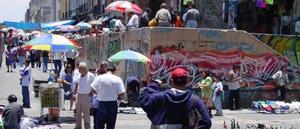Mexico: descent into chaosPersonal cell phone data of millions of Mexicans for sale at Mexico flea market
The Mexican government decreed that all Mexicans must register their cell phones; Mexicans, familiar with the thorough corruption and ineffectiveness of the Mexican state, were worried that the personal information would be stolen or misused; they were right: weeks after millions of Mexicans registered their phones, their personal data became available for sale for a few thousand dollars at Mexico City’s wild Tepito flea market; the treasure trove of data also included lists of police officers with their photographs; in a country seized by the fear of kidnapping and held hostage by violent crime bosses, having this personal information on open display seemed tantamount to a death sentence, or, at the minimum, a magnet for trouble

Mexico City's Tepito flea market // Source: airoots.org
The Mexican government had asked everyone to register their cell phones, but many refused, citing fears of spying or other misuse of the data (“Mexico to disconnect millions of cellphones to fight crime,” 12 April 2010 HSNW). It turns out they were right.
When the government launched a nationwide campaign to register cell phones, millions of Mexicans refused. Thousands of others registered with a familiar name: Felipe Calderon, the country’s president.
Los Angeles Times’s Tracy Wilkinson writes that the idea was that the registry would combat rampant telephone extortion rackets and kidnapping attempts. Even with the threat of having their lines disconnected, an estimated twenty-six million users (about 30 percent of all holders of cell phones in Mexico) had not submitted their names on the eve of the government-set deadline.
Some said they were convinced that the government would use the information to spy on dissidents or anyone else out of favor. Others said they feared the information would end up in the wrong hands.
They were proved right last month when the confidential data of millions of Mexicans from official state registries suddenly became available for a few thousand dollars at Mexico City’s wild Tepito flea market.
Wilkinson notes that in Mexico, unlike the United States, voter sign-up rolls and motor vehicle registrations are not a matter of public record. Mexicans, in theory at least, expect privacy. So when these databases began turning up in the chaotic Tepito market, Mexicans were not pleased.
In a country seized by the fear of kidnapping and held hostage by violent crime bosses, having this quantity of personal information on open display seemed tantamount to a death sentence, or, at the minimum, a magnet for trouble.
It confirmed the worst suspicions of many Mexicans: that any attempt to do their civic duty by registering property or signing up to vote would end up being used against them.
“This was a devastating blow to any effort to create a relationship of trust between citizens and the authorities,” said Gustavo Fondevila, a researcher at the Center for Investigation and Economic Studies, a Mexico City think tank. “There is complete mistrust toward everything the government decides, promises and especially when it asks for personal information. And it is completely justified.”
It is that suspicion that fuels Mexico’s notorious scofflaw culture.
The personal data discovered at the Tepito market, part of an investigation by El Universal newspaper, also included lists of police officers with their photographs, which could easily be cross-referenced with other databases to find out where they live. The paper said a complete package of data could be had for about $12,000.
The revelations lighted a fire under the Mexican Senate, where a privacy law had been languishing. Senators quickly passed the law unanimously late last month and congratulated themselves for being able to give reassurances to the public that their private data would not be misused. Wilkinson quotes a Mexican colloquialism to describe the public’s response to the Senate measure::They were covering the well after the child had drowned.
